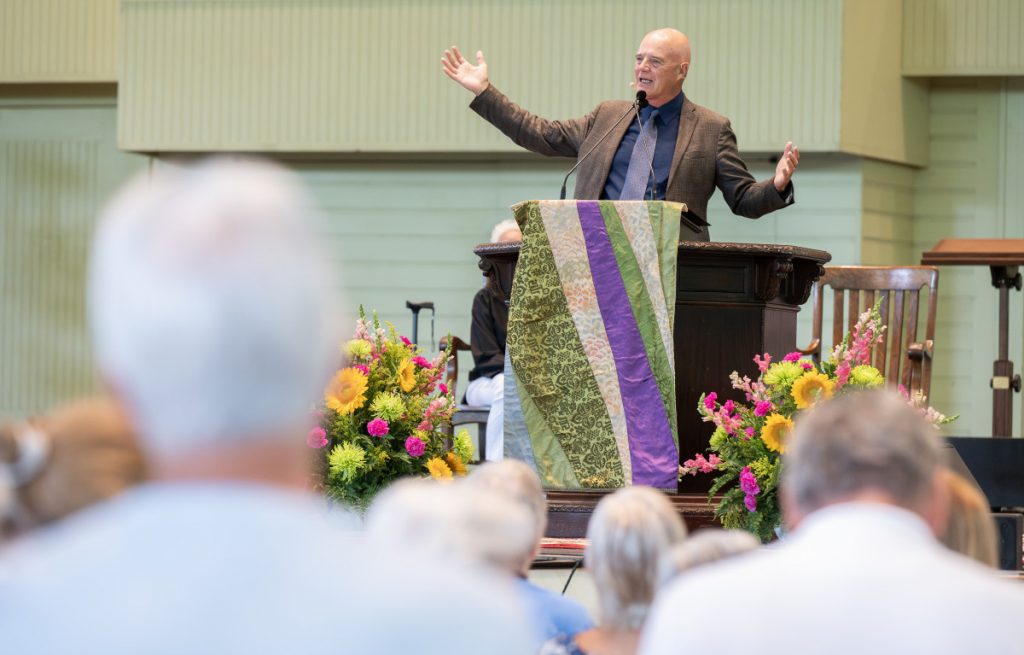
Column by Mary Lee Talbot
“Nobody begins a speech saying I have not come to abolish the tradition unless he thinks that people are likely to think he has come to abolish the tradition,” said the Rev. Brian McLaren. “Jesus felt that his tradition was a mess. He didn’t hate it. He didn’t want to leave it. He loved it. And he felt it was a mess. I don’t know if any of you can identify with that.”
McLaren preached at the 9:15 a.m. Wednesday morning worship service in the Amphitheater. His sermon title was “Jesus as Interpreter of Tradition,” and the scripture reading was Matthew 5:17-28.
Jesus’ culture did not have a tummy ache that needed a dose of Pepto-Bismol; it was in grave danger of losing its soul. The colonizing Romans dominated and exploited the people’s labor and the land. The Romans even helped to fund the building of the temple. “It takes a toll on people,” McLaren said. “I know it’s hard to imagine a world where powerful elites fund religion so they can make sure religion has a positive attitude toward what they want to get away with. I know it’s hard to imagine people co-opting religious zeal for political loyalty. But this has been a favorite trick of authoritarian colonizing regimes throughout history.”
What do the colonized people do? Some, like the Sadducees, try to cooperate and get along. Some, like the Zealots, urge violent revolution and some, like the Essenes, “act like doomsday preppers and wait for God to magically, violently fix everything,” McLaren told the congregation.
Jesus, he continued, believed there was another path, but it was not a wide, well-paved highway — rather, it was a rocky, two-track path that could only be traversed on foot.
For Jesus, it was time to stop and look at the tradition but not in the same old way. “The tradition was good, but it was not perfect,” said McLaren. “The tradition was not where it needed to be and had unfulfilled potential, like a treasure hidden in the back yard that the people did not know about.”
McLaren continued, “Jesus came to fulfill the law, not destroy it. Tradition had brought the people thus far but this was not the place to stop. The greatest way to honor the tradition is to go into the undiscovered territory.”
For Christians, we need to rediscover the Indigenous roots of our tradition, he told the congregation. Christians need to rediscover what their ancestors knew before they became colonizers. “Christian tradition, in all its forms, is a mess. It is divided, conflicted and has sold out. We are very successful at arguing, but unsuccessful at making headway.”
To regain the Indigenous wisdom, Christians need to read the laws and ask what did the law do in the old context, and what does the law need to do in our context? “We need to rediscover the prophets,” McLaren said. “We banish them and then we build monuments to them.”
He continued, “Jesus came to fulfill the law in his context. Jesus said, ‘You have heard it said … but I say to you …’ You know you are dealing with a dangerous person when they say ‘You have heard it said,’ followed by ‘but.’ Jesus did it six times. When he said ‘You have heard it said “Love your friends and hate your enemies. But I say to you,” ’ he dares us to deconstruct the binaries that allow us to kill each other.”
McLaren asked the congregation if they were ready to deal with the conditions that allow people to kill each other, were they ready to go deeper into the question? “We know we should not murder, but are we ready to look at the dehumanizing words we use, and then go deeper to look at the deep anger and unresolved hurt that leads us to dehumanize people and then even deeper to seek reconciliation in those relationships?”
Jesus talked about the act of adultery. “Yeah, we can all say we’re against cheating on each other,” McLaren said. “But what are the conditions that lead to cheating?”
McLaren noted that various expressions of the Christian religion have been obsessed with sex and developed a very sex-negative view. “When you heard this passage this morning, you thought, ‘Oh, there’s this antisex thing.’ I think Jesus is speaking to the men in the room. He says you want to have a world without adultery, and I know it’s hard to imagine a world where religious leaders go around policing people’s sexuality.”
He continued, “But you understand what he says? He says you men, you don’t want adultery, then you better start dealing with the reality of lust, not just lust as sexual desire. Lust is the idea that I’m a man, I have privileges, I can dehumanize other people to make them objects of my own pleasure without worrying about what I do, what effect it has on them as human beings.” There was applause from the congregation.
McLaren said, “Isn’t it interesting in the headlines recently, how the same wealth that makes people think they don’t have to obey other laws makes these wealthy men think that they can get away with sexual murder, destroying human beings?”
McLaren expressed the wish that he could go deeply into all six of the citations from Jesus, until arriving at “that deepest issue that dares us to challenge something that’s deeply embedded in our tradition.”
He said that people think “God is violent, so we can be violent. God hates people — conveniently, the same people we do — so torture and imprisonment and disappearance and putting people in the Alcatraz’s and everywhere else (doesn’t matter because) God doesn’t care about those people. In fact, we’re doing God’s work to clean things up from them. Do you see why I think our traditions, religious, political, social, educational and economical are a mess?”
McLaren concluded with a story of meeting the imam of a neighboring mosque after 9/11. They met for lunch and one day McLaren asked the imam what Muslims thought about Jesus. The imam told him that Muslims consider Jesus the second-greatest prophet.
Then McLaren asked, for a Muslim, what does it mean to be a prophet? The imam said it means “you have a message from God that the world needs, so we should listen to the words of a prophet and do what the prophet taught us, to live according to the teaching of the prophet.”
McLaren had a long conversation with himself. “Christians would be insulted to hear someone say Jesus was the second-greatest prophet, but Christians hardly think of Jesus as a prophet. Jesus had become a lot of different things to us: A hood ornament on the Hummer of Western civilization, the masked guy behind whom we go off into battle against different people, a little equation in a cosmic equation of how God gets rid of our sins so we can go to heaven after we die.”
He continued, “But I think for most Christians, Jesus is less than a prophet because we don’t really pay attention to what he has to say. That’s important for us now because I think our tradition is a mess, and there are undiscovered treasures for us that we need to make it from where we are.”
Melissa Spas, vice president for religion at Chautauqua Institution, presided. Stephanie Dawson, a year-round Chautauqua resident and former Institution employee currently pursuing a new family venture of a garden market and community farm, read the scripture. The prelude was “Prélude, Op. 31, No. 5,” by Louis Vierne, performed by Joshua Stafford, director of sacred music and Jared Jacobsen Chair for the Organ. The Motet Choir sang “If Ye Love Me,” music by Philip Wilby and text from John 14: 15-18. Stafford directed the choir and Brett Miller, an orchestral conducting student at Eastman School of Music, accompanied the choir on the Massey Memorial Organ. For the postlude, Stafford played “Voluntary,” by Edward Elgar, on the Massey Organ. Support for this week’s chaplaincy and preaching is provided by the Robert D. Campbell Memorial Chaplaincy and the Daney-Holden Chaplaincy Fund.
Editor’s note: Because of a series of pagination difficulties, we have not yet been able to publish the morning worship column for Tuesday’s service and sermon; that column will be published in the Friday, Aug. 22, edition of the Daily.




